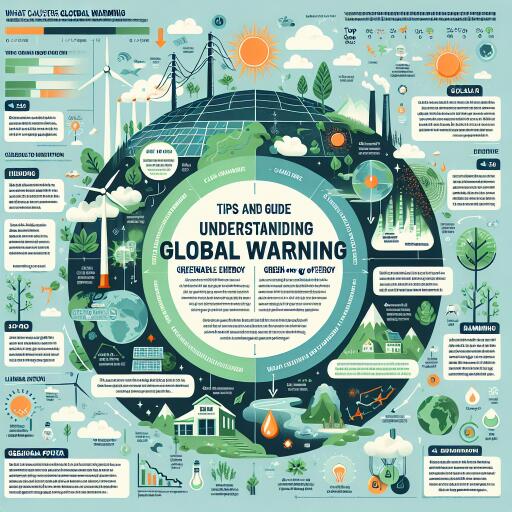
Tips and Guide to Understanding Global Warming: Decoding the Drivers and Solutions for a Greener Future
At the heart of the ecological discourse lies the crucial issue of global warming—a phenomenon marked by the Earth’s steadily rising temperatures, predominantly spurred by human activities that augment the concentration of greenhouse gases in our atmosphere. These gases, including carbon dioxide and methane, function like a blanket, trapping the sun’s heat and, as a result, warming the planet. The ramifications of this global warming extend deeply into our environmental, ecological, and social fabric, making it a pivotal concern for our generation.
What Drives Global Warming?
The escalation of global warming can be chiefly attributed to the consumption of fossil fuels—coal, oil, and natural gas—utilized in generating energy and fueling our modes of transportation. This reliance on fossil fuels results in the emission of colossal amounts of carbon dioxide, exacerbating the greenhouse effect. Another significant contributor is deforestation, which diminishes the Earth’s capability to absorb carbon, further intensifying the atmospheric concentration of greenhouse gases.
Manifestations of Global Warming
The impacts of this gradual warming are diverse and widespread. Coastal communities face the brunt of rising sea levels, while the frequency and severity of extreme weather phenomena—hurricanes, heatwaves, and droughts—escalate, presenting pressing challenges. Variations in precipitation disrupt both agricultural productivity and water availability, and the delicate balance of ecosystems is disturbed, endangering species and biodiversity.
Societal Implications of Global Warming
Global warming transcends environmental concerns, posing direct threats to human health through the uptick in heat-related afflictions, respiratory issues, and cardiovascular diseases. Vulnerabilities in water supply and food production are becoming more pronounced, especially in regions already grappling with these challenges. The economic ramifications are equally significant, affecting infrastructure, agriculture, and the tourism industry.
Strategies for Mitigation
To curtail the progression of global warming, a collaborative effort to diminish greenhouse gas emissions is imperative. Embracing renewable energy sources like solar and wind, alongside improving energy efficiency across buildings, transportation, and industries, can lead to substantial emission reductions. Furthermore, advancing carbon capture and storage technologies offers a pathway to directly removing carbon dioxide from the environment.
Adaptation Measures
While mitigating global warming is crucial, adapting to its ongoing effects is equally important. Constructing seawalls and enhancing flood defenses are vital for safeguarding coastal regions. Urban planning that prioritizes heat adaptation through the integration of air conditioning and green spaces can mitigate health risks. Additionally, adopting sustainable agricultural techniques is essential for bolstering food security in the face of climatic shifts.
The Role of International Collaboration
Combatting global warming necessitates a global response, underscored by the Paris Agreement—an international accord aimed at containing the rise in global temperatures through the reduction of greenhouse gases and the promotion of sustainable practices. Countries across the globe are thus rallying towards cleaner energy solutions, resilient infrastructure, and the conservation of ecosystems in a collective bid to confront climate change.
Wrapping Up
Understanding the underpinnings and implications of global warming is the first step towards forging a path to sustainability. As we delve into the causes, discern the effects, and explore the viable solutions, it becomes clear that a concerted effort is essential. The collective action of individuals, communities, and nations around the world can steer us towards a more sustainable and resilient future, ensuring the well-being of the planet for future generations.Embracing this collaborative spirit, let us work hand in hand towards mitigating the impacts of climate change, adopting sustainable practices, and championing green energy to pave the way for a healthier Earth.





Leave a Reply